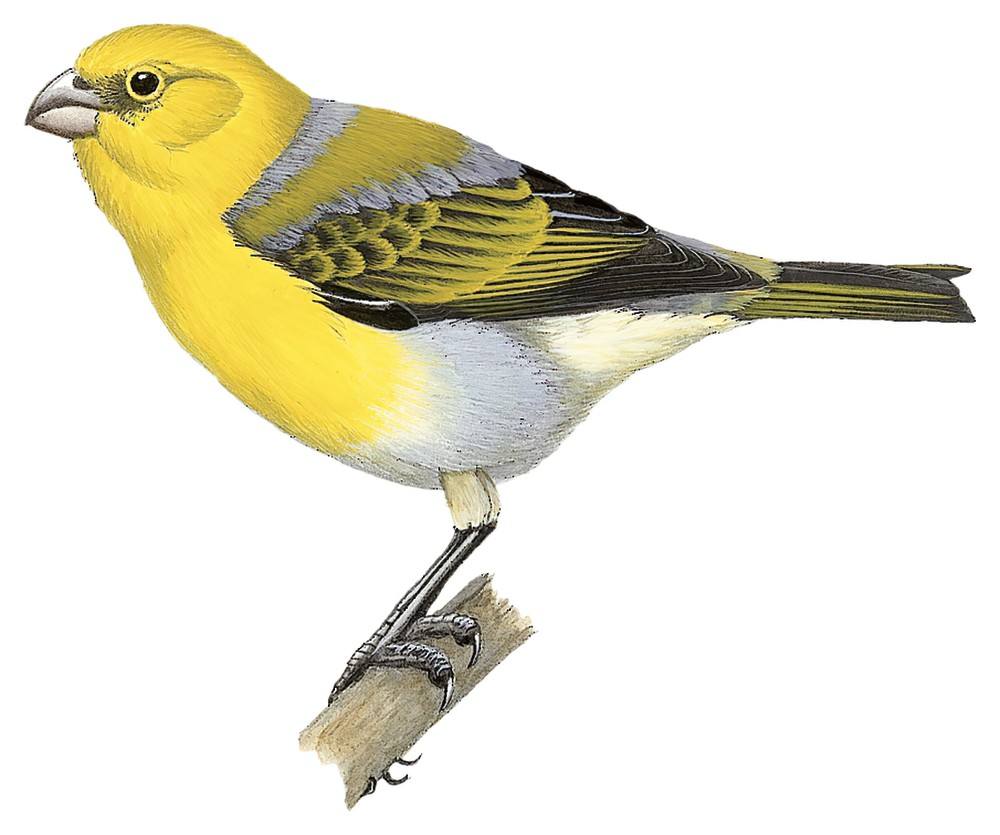Nihoa Finch / Telespiza ultima

Nihoa Finch
SCI Name:
Protonym: Telespiza ultima Auk 34 p.70,71
Taxonomy: Passeriformes / Fringillidae / Telespiza
Taxonomy Code: nihfin
Type Locality: Nihoa.
Author: Bryan
Publish Year: 1917
IUCN Status: Critically Endangered
DEFINITIONS
TELESPIZA
(Fringillidae; Ϯ Laysan Finch T. cantans) Gr. τηλε tēle far off, at a distance (cf. τελεος teleos perfect); σπιζα spiza finch < σπιζω spizō to chirp; "This bird has a very clear metallic note, which may be expressed thus — chwit, chwee. It also twitters and chirps as it hops from side to side of the cage, and is altogther very lively in its movements. ... The Finch appears to belong to a new genus, allied to Psittirostra of the Hawaiian group, from which it differs in its thicker bill, the upper mandible being less produced, and showing a slight tendency to cross the lower mandible, as in Loxia. The feet are remarkably large and strong. The wings are moderate, reaching to about the end of the basal third of the tail-feathers. The tail is slightly forked. I propose to describe it as follows: — TELESPYZA CANTANS, gen. et sp. n. (Plate IX [TELESPIZA CANTANS].) ... Hab. Midway Island, North Pacific." (S. B. Wilson 1890); "Because both orthographies occur with the original description, Telespyza can be regarded as a printer's error. Therefore, Telespiza would be the correct spelling if one were to recognize this genus as distinct from Psittirostra Temminck (which we do not)" (Olson & James 1986); "Telespyza Wilson, 1890, Ibis, p. 341. Type, by monotypy, Telespyza cantans Wilson." (Greenway in Peters 1968, XIV, 102); "TELESPIZA S. B. Wilson, 1890 F — Telespiza cantans S. B. Wilson, 1890; type by monotypy" (Dickinson & Christidis (eds.) 2014, 320). The Laysan Finch was erroneously described from the remote Midway atoll in the North Pacific Ocean.
Var. Telespyza (original spelling).
ultima / ultimum / ultimus
L. ultimus finally, farthest, end, extreme, greatest < super. ultra farther, beyond.
● TL. Río Grande, Tierra del Fuego, Argentina (subsp. Geospizopsis unicolor).
● “Bryan [1917] named the species ultima because he was sure it was the last endemic Hawaiian bird that would be discovered” (Munro 1960) (Telespiza).
UPPERCASE: current genus
Uppercase first letter: generic synonym
● and ● See: generic homonyms
lowercase: species and subspecies
●: early names, variants, mispellings
‡: extinct
†: type species
Gr.: ancient Greek
L.: Latin
<: derived from
syn: synonym of
/: separates historical and modern geographic names
ex: based on
TL: type locality
OD: original diagnosis (genus) or original description (species)












